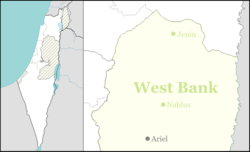Har Brakha
| Har Brakha הַר בְּרָכָה | |
|---|---|
 Har Brakha | |
| Coordinates: 32°11′34.07″N 35°15′55.08″E / 32.1927972°N 35.2653000°ECoordinates: 32°11′34.07″N 35°15′55.08″E / 32.1927972°N 35.2653000°E | |
| District | Judea and Samaria Area |
| Council | Shomrom |
| Region | West Bank |
| Founded | 1983 |
| Founded by | Nahal |
| Population (2015)[1] | 2,267 |
| Name meaning | Mount of Blessing |
Har Brakha (Hebrew: הַר בְּרָכָה, lit. Mount [of] Blessing) is a communal Israeli settlement located on the southern ridge of Mount Gerizim at an elevation of 870 metres above sea level, in the West Bank's Samarian mountains near Nablus. Har Brakha is named after one of the two mountains that are mentioned in Deuteronomy on which half of the twelve tribes of Israel ascended in order to pronounce blessings,[2] and shares the Mount Gerizim ridge with Kiryat Luza, the main Samaritan village. In 2015 it had a population of 2,267
The international community considers Israeli settlements in the West Bank illegal under international law, but the Israeli government disputes this.[3]
History
Har Brakha was first established as a pioneer Nahal military outpost, and demilitarized when turned over to residential purposes on Yom Ha'atzmaut in 1983. The rapid expansion of the village is universally attributed to the Yeshivat Har Brakha, which was built in 1991 as well as its rosh yeshiva, Rabbi Eliezer Melamed, who is also the chief rabbi of Har Brakha. While the vast majority of students (about 150 annually) are not originally from settlements, many graduates of the yeshiva return to live on the settlement.
Until the yeshiva was built, Har Brakha was almost in danger of abandonment. Because of its location, isolated from Israeli population centers and lacking modern amenities in the 1980s, most families that came to live left soon after, even with incentives such as low-interest mortgages and grants. Even now that these housing subsidies are not available, demand for residence outstrips the supply of homes, the building of which is limited by the Civil Administration of the Israeli Defense Forces which sometimes completely forbids any new building, effectively stopping any expansion. Evangelical Christians from the United States have joined the community, with the support of Rabbi Melamed, and their presence has aroused some controversy among residents.[4]
References
- ↑ "List of localities, in Alphabetical order" (PDF). Israel Central Bureau of Statistics. Retrieved 16 October 2016.
- ↑ Deuteronomy 27:11-13
- ↑ "The Geneva Convention". BBC News. 10 December 2009. Retrieved 27 November 2010.
- ↑ Tzofia Hirschfeld, 'Har Bracha Residents: Christians Out!,' at Ynet 2 December 2011.
External links
- Har Brakha profile Shechem
- Pictures of Har Brakha by Menachem Brody
- A winning economic formula Israel Hayom, September 20, 2012